Here are 160 of the most notable Art of War quotes that include the best leadership and strategy lessons from Sun Tzu—the most well-known Chinese general and war strategist that influenced the world’s philosophy and military thinking.
So, if you’re looking for some pieces of wisdom that you can apply to your life, then be sure to check out these quotes with lessons that stood the test of time.
Read the full collection below.
And don’t miss out these war quotes.
Best Art of War Quotes
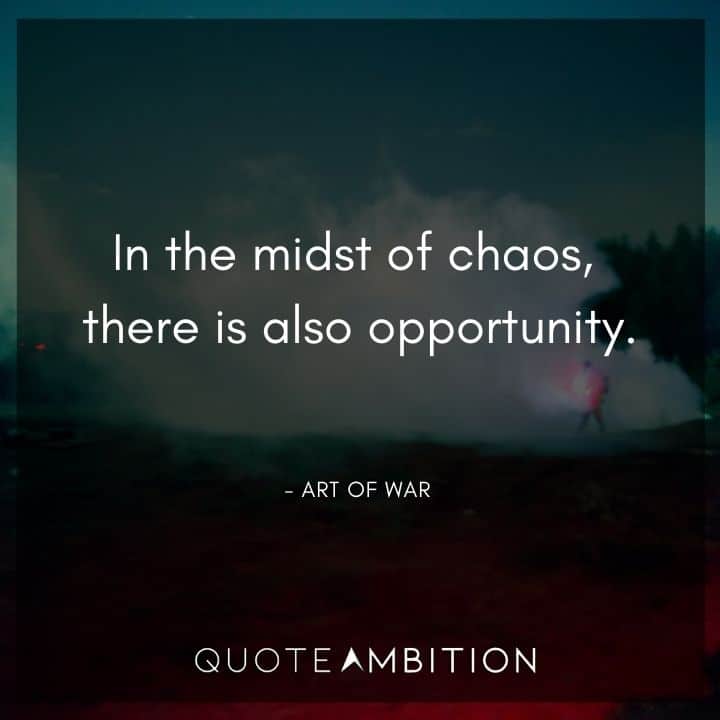
1. “In the midst of chaos, there is also opportunity.”
2. “Treat your men as you would your own beloved sons, and they will follow you into the deepest valley.”
3. “So in war, the way is to avoid what is strong, and strike at what is weak.”
4. “Let your plans be dark and impenetrable as night, and when you move, fall like a thunderbolt.”
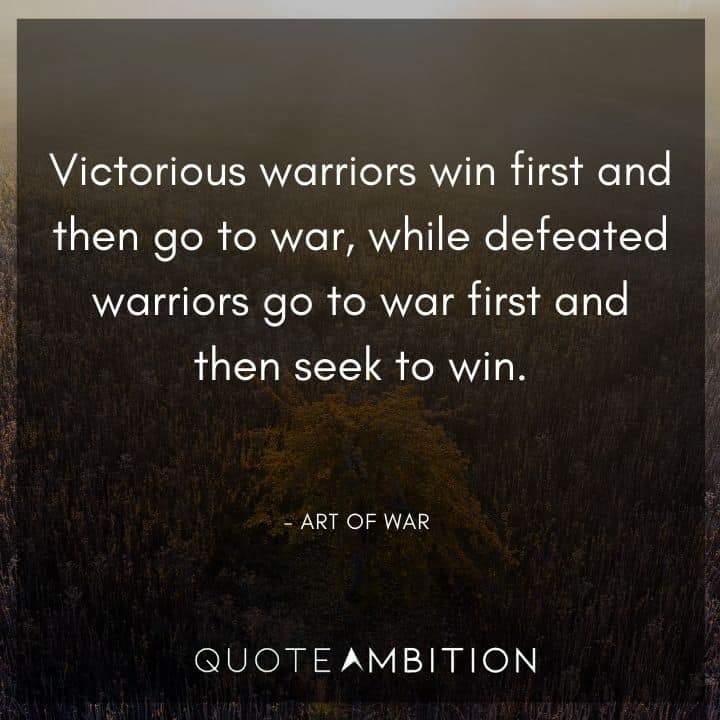
5. “Victorious warriors win first and then go to war, while defeated warriors go to war first and then seek to win.”
6. “Engage people with what they expect; it is what they are able to discern and confirm their projections. It settles them into predictable patterns of response, occupying their minds while you wait for the extraordinary moment, that which they cannot anticipate.”
7. “The art of war is of vital importance to the state. It is a matter of life and death—a road either to safety or to ruin. Hence, it is a subject of inquiry which can on no account be neglected.”
8. “Appear weak when you are strong, and strong when you are weak.”
9. “Supreme excellence consists of breaking the enemy’s resistance without fighting.”
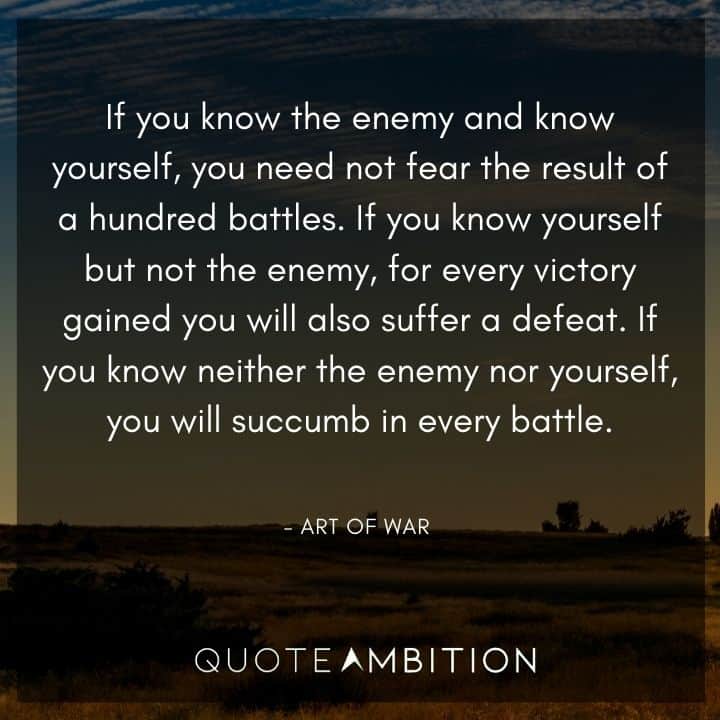
10. “If you know the enemy and know yourself, you need not fear the result of a hundred battles. If you know yourself but not the enemy, for every victory gained you will also suffer a defeat. If you know neither the enemy nor yourself, you will succumb in every battle.”
11. “There is no instance of a nation benefitting from prolonged warfare.”
12. “When we are able to attack, we must seem unable; when using our forces, we must appear inactive; when we are near, we must make the enemy believe we are far away; when far away, we must make him believe we are near.”
13. “Move swift as the wind and closely-formed as wood. Attack like fire and be still as the mountain.”
14. “When the enemy is relaxed, make them toil. When full, starve them. When settled, make them move.”
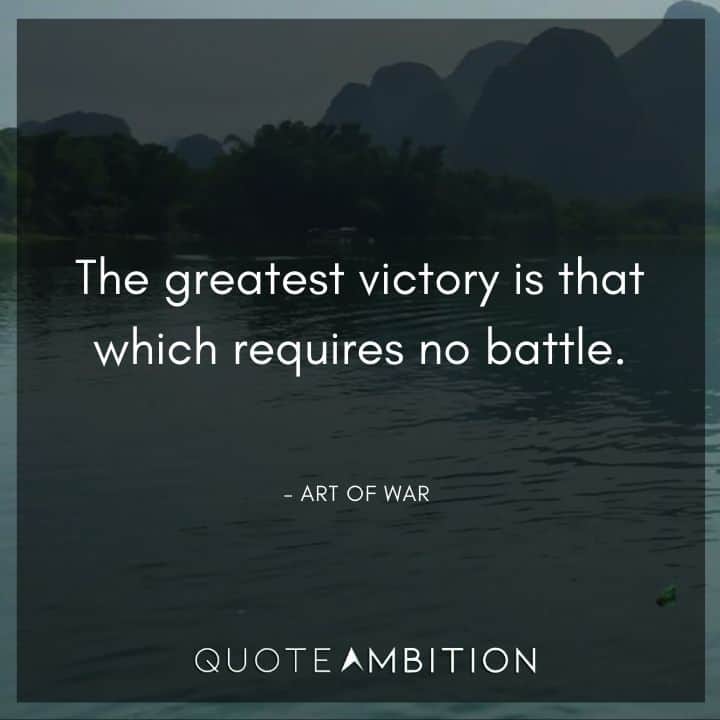
15. “The greatest victory is that which requires no battle.”
16. “If your enemy is secure at all points, be prepared for him. If he is in superior strength, evade him. If your opponent is temperamental, seek to irritate him. Pretend to be weak, that he may grow arrogant. If he is taking his ease, give him no rest. If his forces are united, separate them. If sovereign and subject are in accord, put division between them.”
17. “When you surround an army, leave an outlet free. Do not press a desperate foe too hard.”
18. “Danger has a bracing effect.”
19. “Hold out baits to entice the enemy. Feign disorder, and crush him.”
Art of War Quotes on Strategies and Advancements
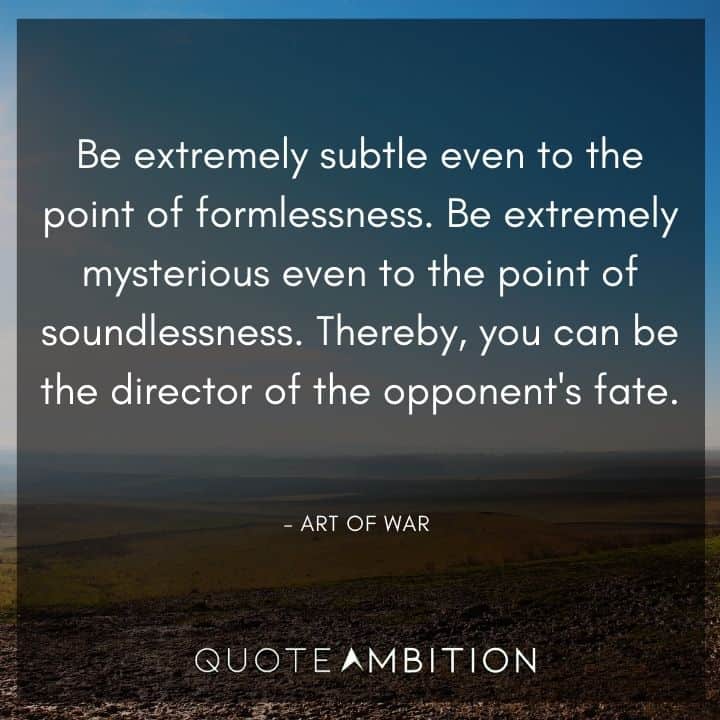
20. “Be extremely subtle even to the point of formlessness. Be extremely mysterious even to the point of soundlessness. Thereby, you can be the director of the opponent’s fate.”
21. “The wise warrior avoids the battle.”
22. “The whole secret lies in confusing the enemy, so that he cannot fathom our real intent.”
23. “Attack is the secret of defense; defense is the planning of an attack.”
24. “Attack him where he is unprepared, appear where you are not expected.”
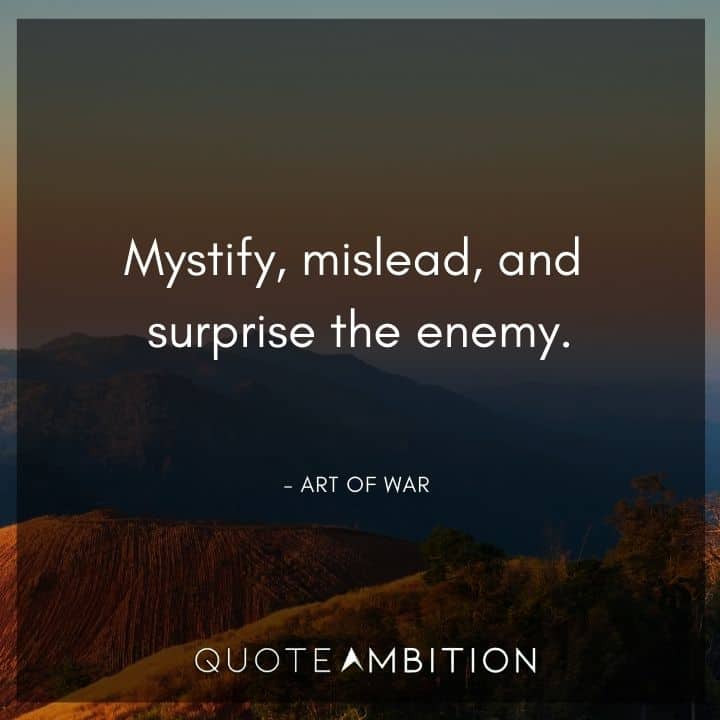
25. “Mystify, mislead, and surprise the enemy.”
26. “When your army has crossed the border, you should burn your boats and bridges in order to make it clear to everybody that you have no hankering after home.”
27. “Plan for what is difficult while it is easy, do what is great while it is small.”
28. “Do not swallow bait offered by the enemy. Do not interfere with an army that is returning home.”
29. “One may know the condition of a whole army from the behavior of a single man.”
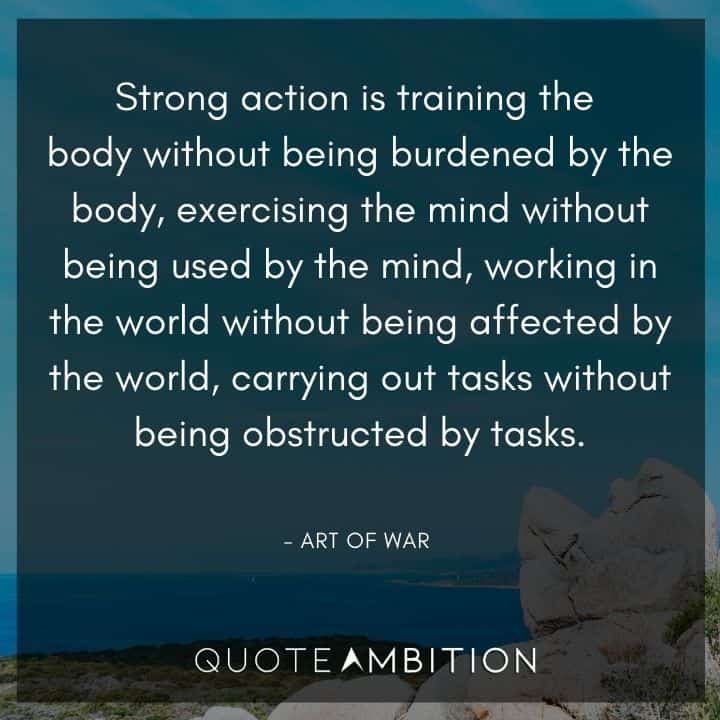
30. “Strong action is training the body without being burdened by the body, exercising the mind without being used by the mind, working in the world without being affected by the world, carrying out tasks without being obstructed by tasks.”
31. “The spot where we intend to fight must not be made known; for then the enemy will have to prepare against a possible attack at several different points.”
32. “By reinforcing every part, he weakens every part.”
33. “All men can see the tactics whereby I conquer, but what none can see is the strategy out of which victory is evolved.”
34. “If we wish to wrest an advantage from the enemy, we must not fix our minds on that alone, but allow for the possibility of the enemy also doing some harm to us, and let this enter as a factor into our calculations.”
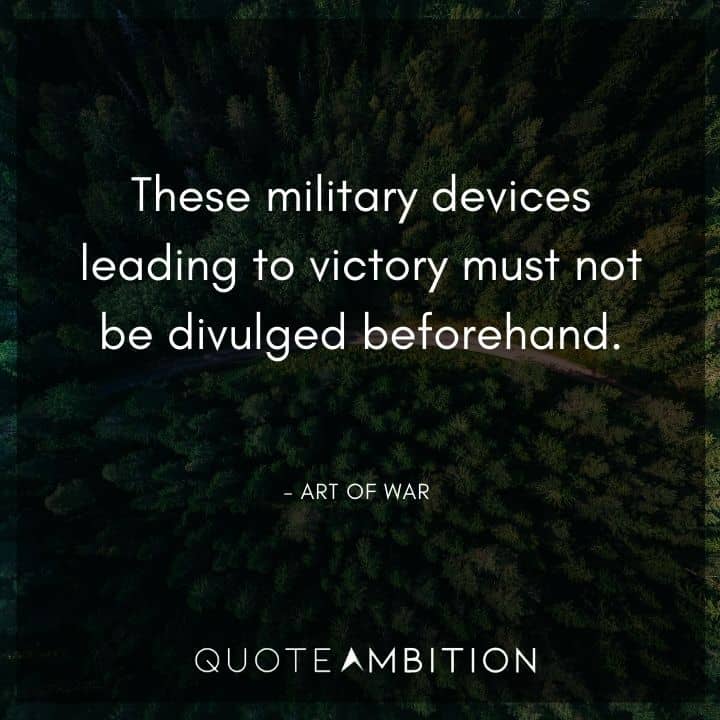
35. “These military devices leading to victory must not be divulged beforehand.”
36. “Therefore, the skillful leader subdues the enemy’s troops without any fighting; he captures their cities without laying siege to them; he overthrows their kingdom without lengthy operations in the field.”
37. “First, lay plans which will ensure victory, and then lead your army to battle; if you will not begin with stratagem but rely on brute strength alone, victory will no longer be assured.”
38. “If we wish to fight, the enemy can be forced to an engagement even though he is sheltered behind a high rampart and a deep ditch. All we need do is attack some other place that he will be obliged to relieve.”
39. “At first, then, exhibit the coyness of a maiden until the enemy gives you an opening. Afterwards, emulate the rapidity of a running hare, and it will be too late for the enemy to oppose you.”
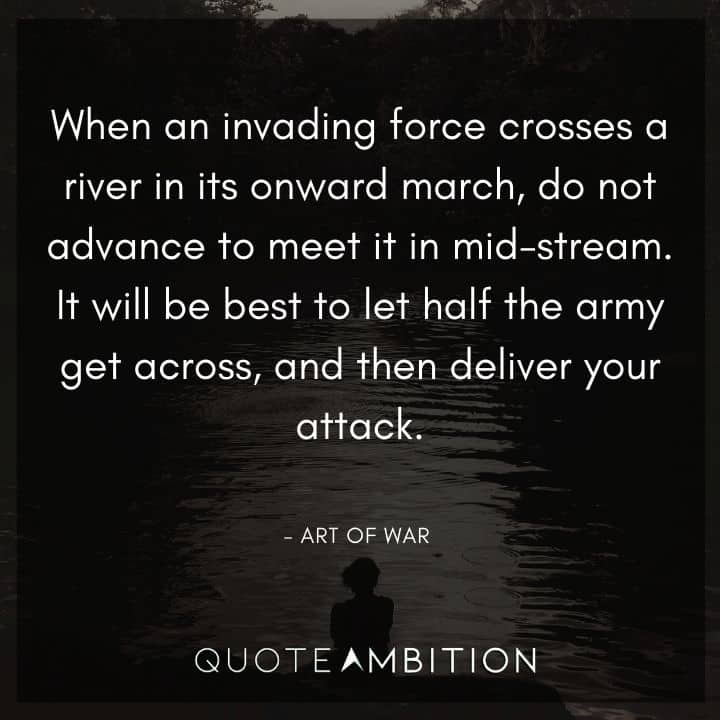
40. “When an invading force crosses a river in its onward march, do not advance to meet it in mid-stream. It will be best to let half the army get across, and then deliver your attack.”
41. “On open ground, do not try to block the enemy’s way. On the ground of intersecting highways, join hands with your allies.”
42. “It is the rule in war, if our forces are ten to the enemy’s one, to surround him; if five to one, to attack him; if twice as numerous, to divide our army into two.”
43. “Hence, the skillful fighter puts himself into a position which makes defeat impossible, and does not miss the moment for defeating the enemy.”
44. “Water shapes its course according to the nature of the ground over which it flows; the soldier works out his victory in relation to the foe whom he is facing.”
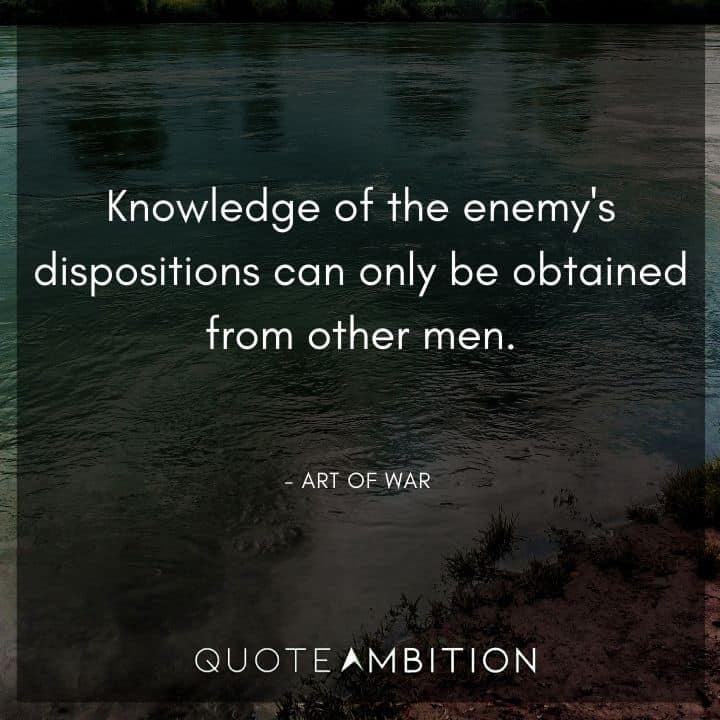
45. “Knowledge of the enemy’s dispositions can only be obtained from other men.”
46. “Stir opponents up, making them respond to you; then you can observe their forms of behavior, and whether they are orderly or confused.”
47. “Weapons are inauspicious instruments, not the tools of the enlightened. When there is no choice but to use them, it is best to be calm and free from greed, and not celebrate victory. Those who celebrate victory are bloodthirsty, and the bloodthirsty cannot have their way with the world.”
48. “Violent language and driving forward as if to the attack are signs that he will retreat.”
49. “The quality of decision is like the well-timed swoop of a falcon which enables it to strike and destroy its victim.”
Art of War Quotes on Leadership and Authority
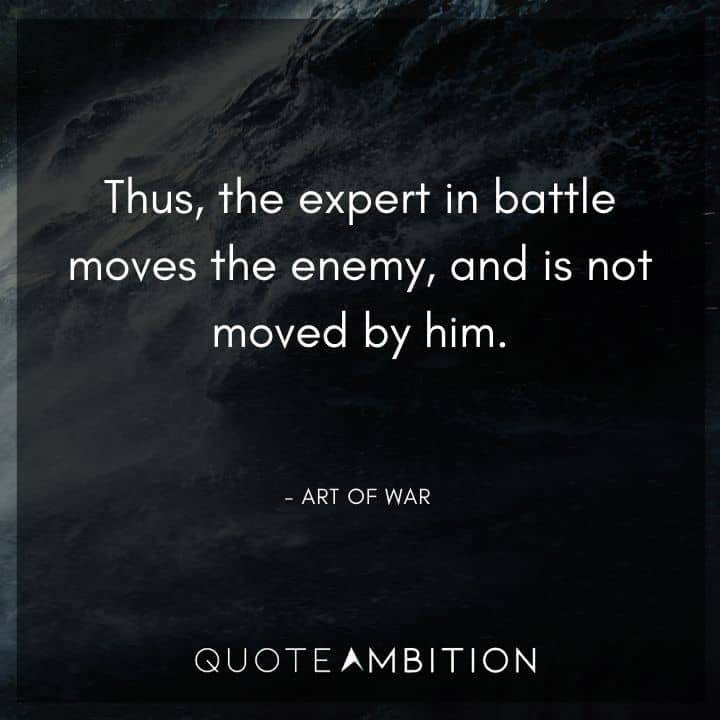
50. “Thus, the expert in battle moves the enemy, and is not moved by him.”
51. “There are roads which must not be followed, armies which must not be attacked, towns which must not be besieged, positions which must not be contested, commands of the sovereign which must not be obeyed.”
52. “Great results can be achieved with small forces.”
53. “If soldiers are punished before they have grown attached to you, they will not prove submissive; and unless submissive, then they will be practically useless. If, when the soldiers have become attached to you, punishments are not enforced, they will still be useless.”
54. “Move not unless you see an advantage; use not your troops unless there is something to be gained; fight not unless the position is critical.”
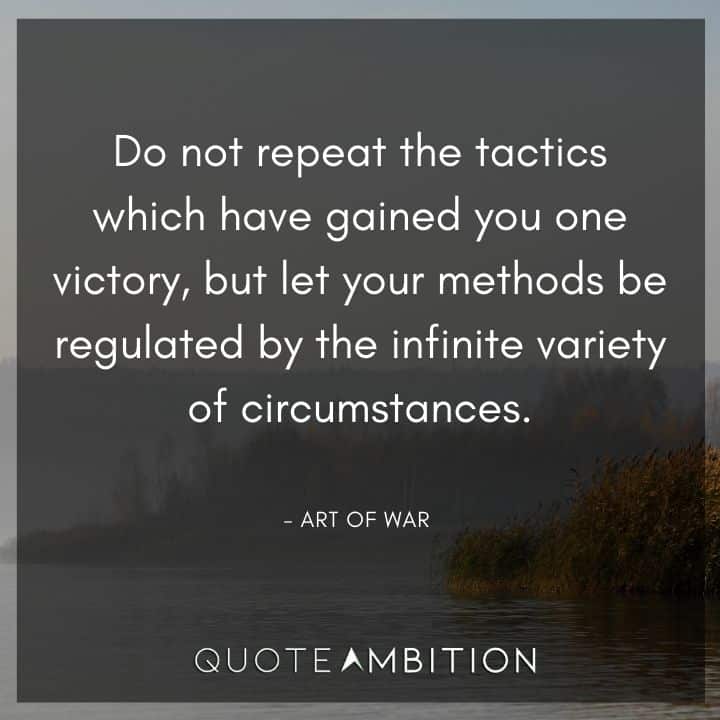
55. “Do not repeat the tactics which have gained you one victory, but let your methods be regulated by the infinite variety of circumstances.”
56. “It is only the enlightened ruler and the wise general who will use the highest intelligence of the army for the purposes of spying, and thereby they achieve great results.”
57. “Hence, a commander who advances without any thought of winning personal fame and withdraws in spite of certain punishment, whose only concern is to protect his people and promote the interests of his ruler, is the nation’s treasure.”
58. “If he is generous with them and yet they do not do as he tells them; if he loves them and yet they do not obey his commands; if he is so undisciplined with them that he cannot bring them into proper order, they will be like spoiled children who can be put to no good use at all.”
59. “If there is disturbance in the camp, the general’s authority is weak.”
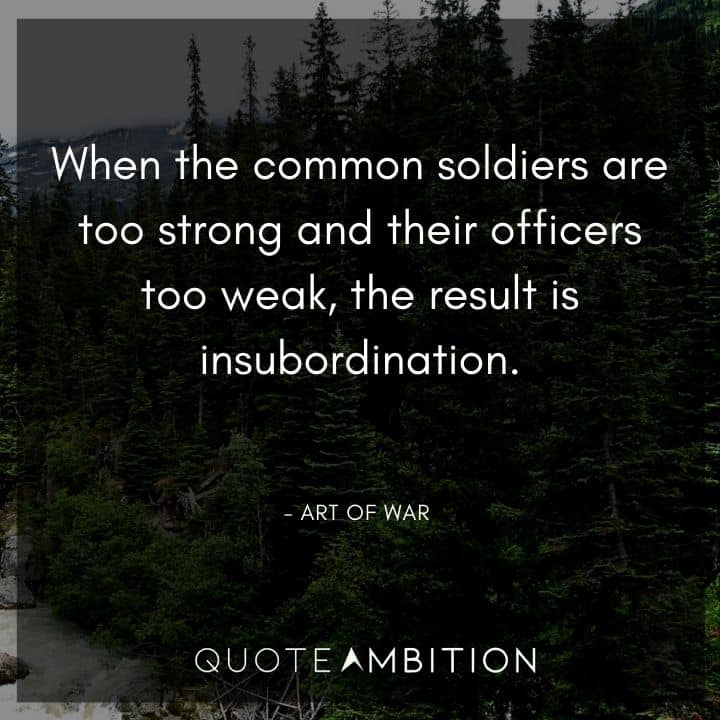
60. “When the common soldiers are too strong and their officers too weak, the result is insubordination.”
61. “The good fighters of old first put themselves beyond the possibility of defeat, and then waited for an opportunity of defeating the enemy.”
62. “When the general is weak and without authority; when his orders are not clear and distinct; when there are no fixed duties assigned to officers and men, and the ranks are formed in a slovenly haphazard manner, the result is utter disorganization.”
63. “For the wise man delights in establishing his merit, the brave man likes to show his courage in action, the covetous man is quick at seizing advantages, and the stupid man has no fear of death.”
64. “It is best to keep one’s own state intact; to crush the enemy’s state is only second best.”
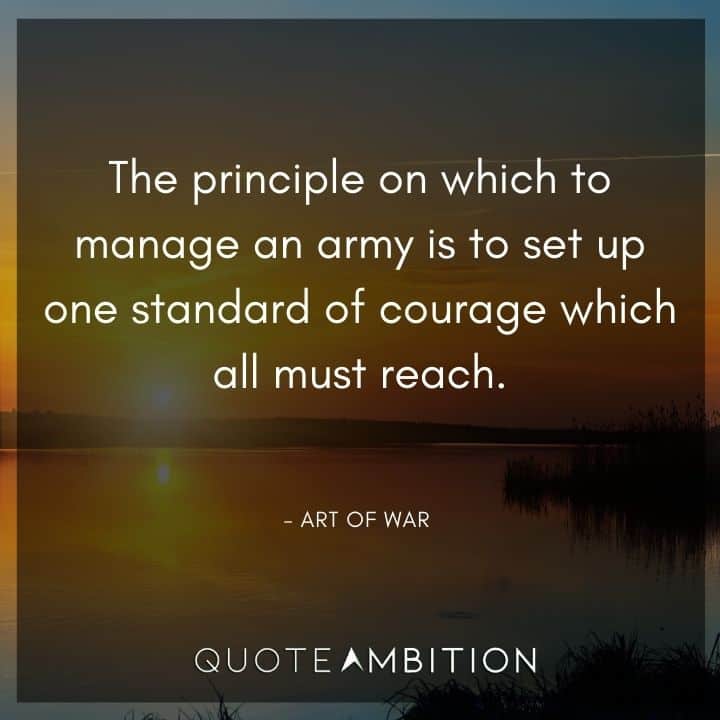
65. “The principle on which to manage an army is to set up one standard of courage which all must reach.”
66. “There are five dangerous faults which may affect a general—recklessness, which leads to destruction; cowardice, which leads to capture; a hasty temper, which can be provoked by insults; a delicacy of honor which is sensitive to shame; over-solicitude for his men, which exposes him to worry and trouble.”
67. “If you do not take opportunity to advance and reward the deserving, your subordinates will not carry out your commands, and disaster will ensue.”
68. “We are not fit to lead an army on the march unless we are familiar with the face of the country—its mountains and forests, its pitfalls and precipices, its marshes and swamps.”
69. “Thus, what enables the wise sovereign and the good general to strike and conquer, and achieve things beyond the reach of ordinary men, is foreknowledge.”
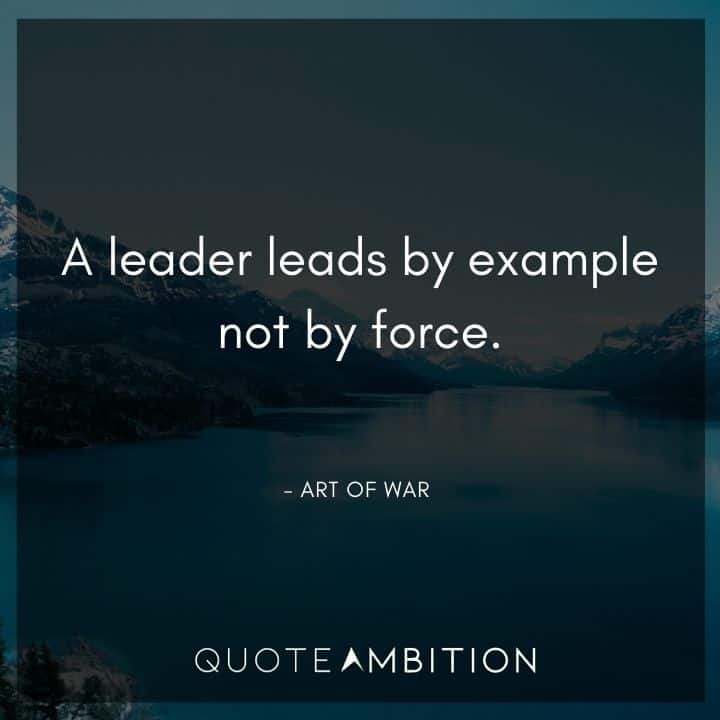
70. “A leader leads by example not by force.”
71. “Excessive rewards are a sign of desperation. Excessive punishments are a sign of exhaustion.”
72. “The general who wins a battle makes many calculations in his temple before the battle is fought. The general who loses a battle makes but few calculations.”
73. “By method and discipline are to be understood the marshaling of the army in its proper subdivisions, the graduations of rank among the officers, the maintenance of roads by which supplies may reach the army, and the control of military expenditure.”
74. “Hence, in the wise leader’s plans, considerations of advantage and of disadvantage will be blended together.”
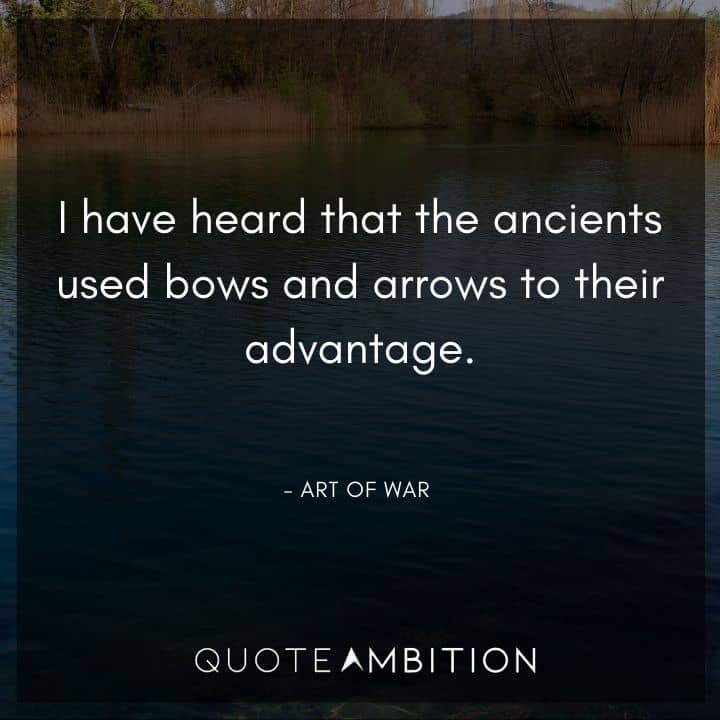
75. “I have heard that the ancients used bows and arrows to their advantage.”
76. “The art of war teaches us to rely not on the likelihood of the enemy’s not coming, but on our own readiness to receive him; not on the chance of his not attacking, but rather on the fact that we have made our position unassailable.”
77. “The general, unable to control his irritation, will launch his men to the assault like swarming ants, with the result that one-third of his men are slain, while the town still remains untaken. Such are the disastrous effects of a siege.”
78. “Leadership is a matter of intelligence, trustworthiness, humaneness, courage, and sternness.”
79. “One mark of a great soldier is that he fights on his own terms or fights not at all.”
Art of War Quotes on Gaining Wins and Learning From Losses
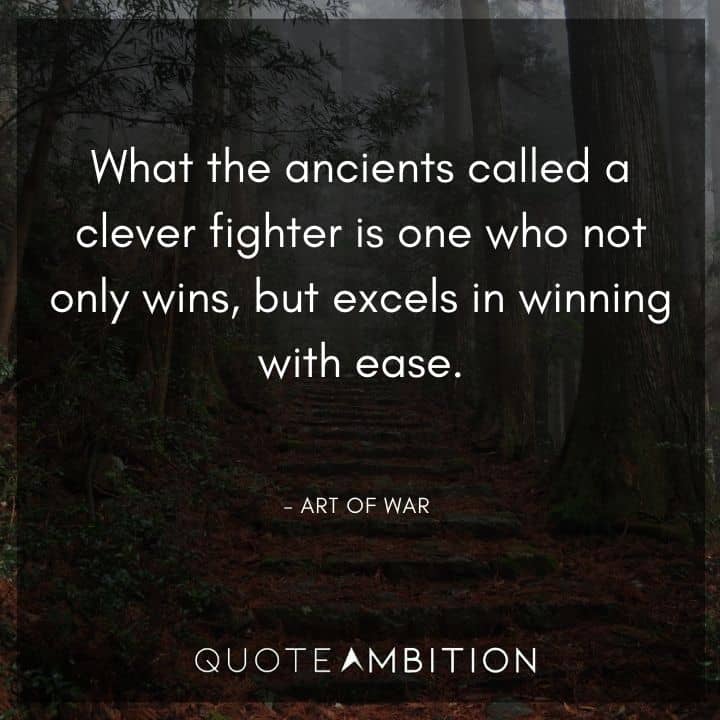
80. “What the ancients called a clever fighter is one who not only wins, but excels in winning with ease.”
81. “He who is prudent and lies in wait for an enemy who is not, will be victorious.”
82. “Knowing the enemy enables you to take the offensive; knowing yourself enables you to stand on the defensive.”
83. “He will win who, prepared himself and waits to take the enemy unprepared.”
84. “Conform to the enemy’s tactics until a favorable opportunity offers. Then, come forth and engage in a battle that shall prove decisive.”
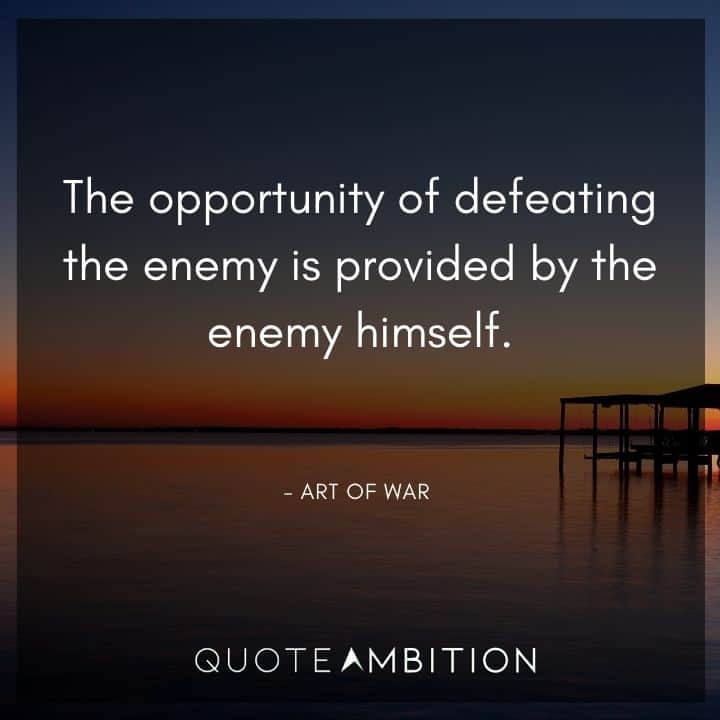
85. “The opportunity of defeating the enemy is provided by the enemy himself.”
86. “The worst calamities that befall an army arise from hesitation.”
87. “You can be sure of succeeding in your attacks if you only attack places which are undefended.”
88. “You can ensure the safety of your defense if you only hold positions that cannot be attacked.”
89. “Whoever is first in the field and awaits the coming of the enemy, will be fresh for the fight; whoever is second in the field and has to hasten to battle will arrive exhausted.”
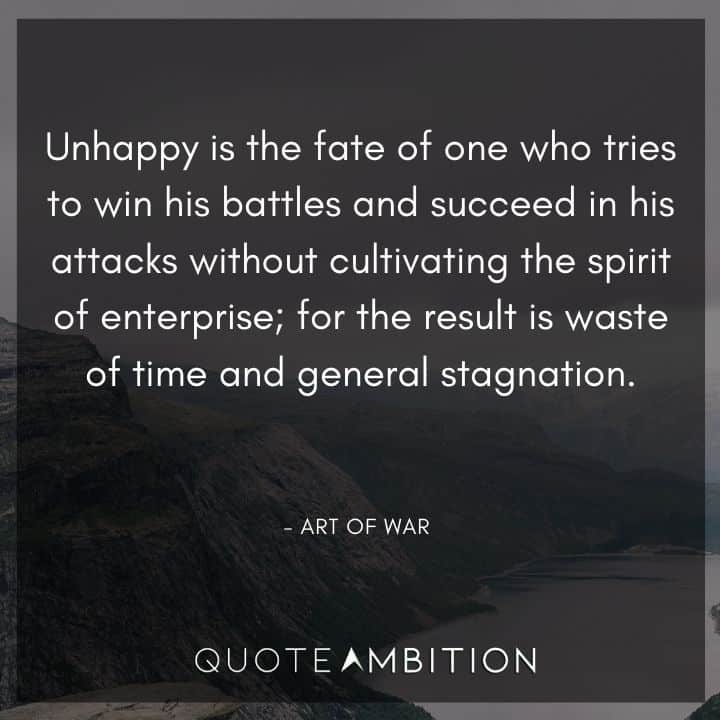
90. “Unhappy is the fate of one who tries to win his battles and succeed in his attacks without cultivating the spirit of enterprise; for the result is waste of time and general stagnation.”
91. “He who relies solely on warlike measures shall be exterminated; he who relies solely on peaceful measures shall perish.”
92. “So long as victory can be attained, stupid haste is preferable to clever dilatoriness.”
93. “Thus, it is that in war, the victorious strategist only seeks battle after the victory is won; whereas, he who is destined to defeat first fights and afterwards looks for victory.”
94. “To begin by bluster, but afterwards to take fright at the enemy’s numbers, shows a supreme lack of intelligence.”
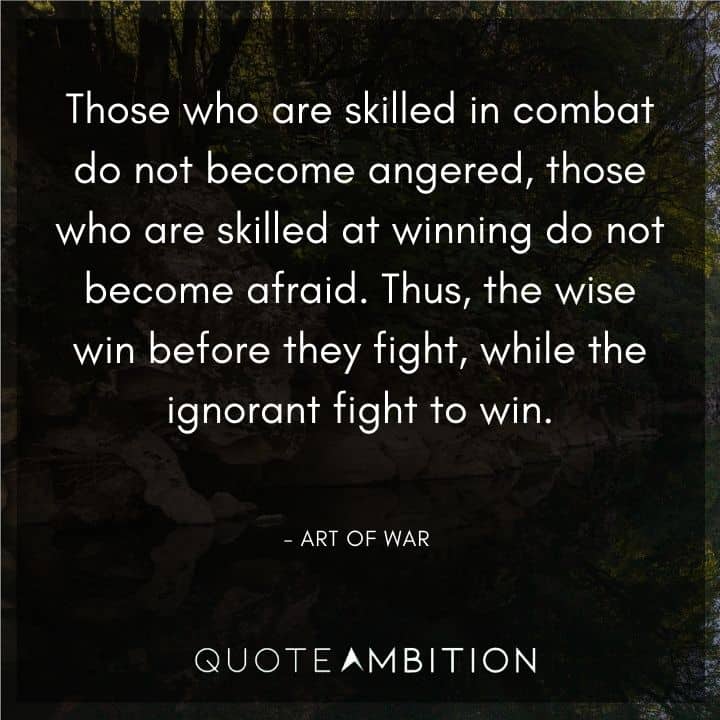
95. “Those who are skilled in combat do not become angered, those who are skilled at winning do not become afraid. Thus, the wise win before they fight, while the ignorant fight to win.”
96. “He wins his battles by making no mistakes.”
97. “Making no mistakes is what establishes the certainty of victory, for it means conquering an enemy that is already defeated.”
98. “In war, practice dissimulation, and you will succeed.”
99. “When you engage in actual fighting, if victory is long in coming, then men’s weapons will grow dull and their ardour will be damped. If you lay siege to a town, you will exhaust your strength.”
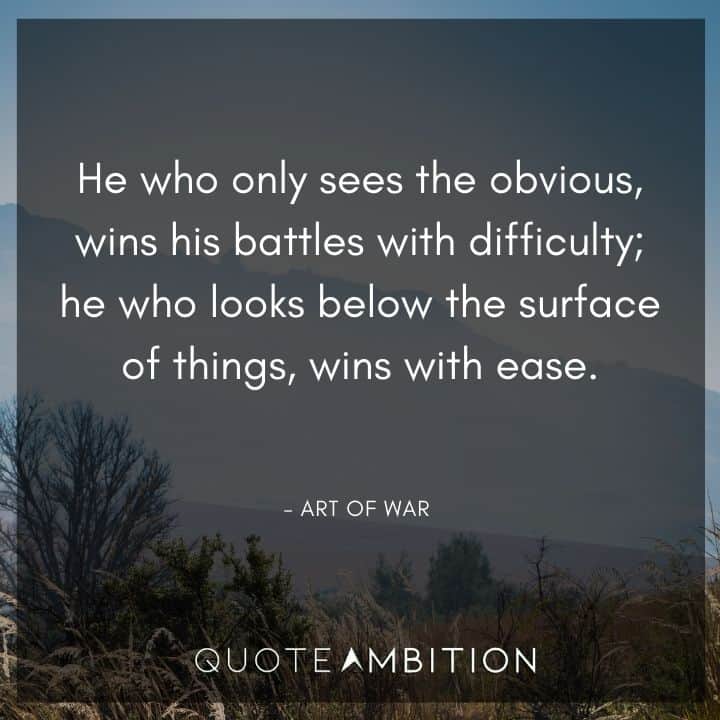
100. “He who only sees the obvious, wins his battles with difficulty; he who looks below the surface of things, wins with ease.”
101. “There are three avenues of opportunity—events, trends, and conditions. When opportunities occur through events but you are unable to respond, you are not smart. When opportunities become active through a trend and yet you cannot make plans, you are not wise. When opportunities emerge through conditions but you cannot act on them, you are not bold.”
102. “The consummate leader cultivates the Moral Law, and strictly adheres to method and discipline; thus, it is in his power to control success.”
103. “Rapidity is the essence of war.”
104. “Prohibit omens altogether. You can best predict your future by controlling it yourself, not by trusting luck or fate to control it.”
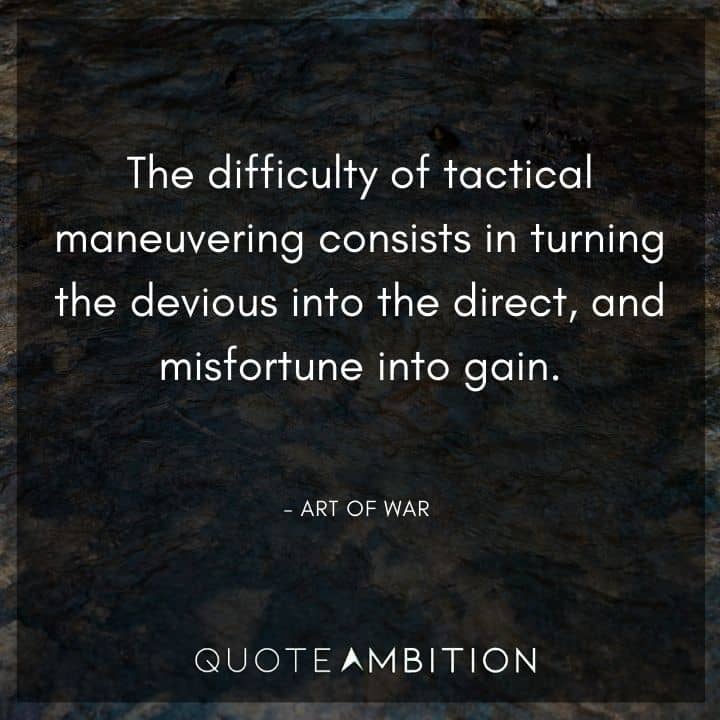
105. “The difficulty of tactical maneuvering consists in turning the devious into the direct, and misfortune into gain.”
106. “The secret of getting successful work out of your trained men lies in one nutshell—in the clearness of the instructions they receive.”
107. “It is only one who is thoroughly acquainted with the evils of war that can thoroughly understand the profitable way of carrying it on.”
108. “Let your rapidity be that of the wind, your compactness that of the forest.”
109. “He who wishes to fight must first count the cost.”
Art of War Quotes on the State and Warfare
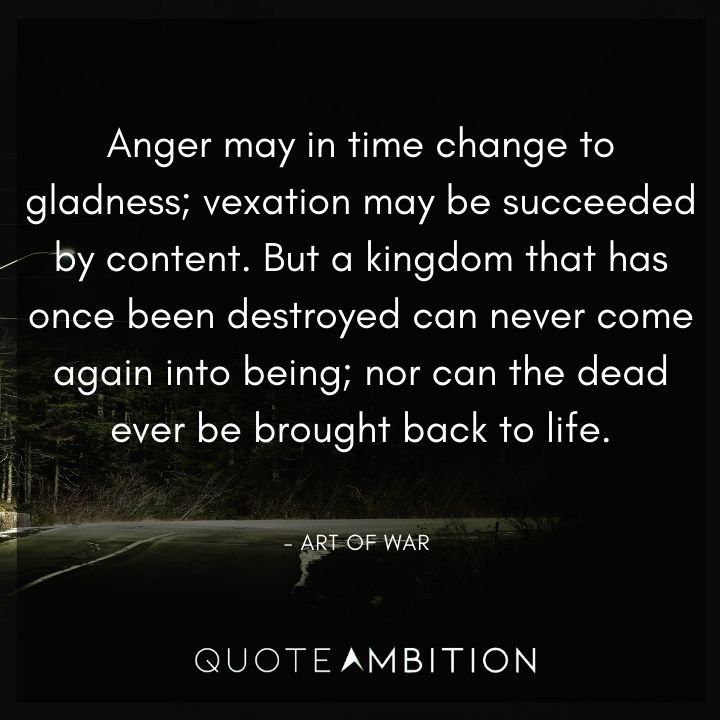
110. “Anger may in time change to gladness; vexation may be succeeded by content. But a kingdom that has once been destroyed can never come again into being; nor can the dead ever be brought back to life.”
111. “It is easy to love your friend, but sometimes the hardest lesson to learn is to love your enemy.”
112. “Never venture, never win!”
113. “Rewards for good service should not be deferred a single day.”
114. “Therefore, just as water retains no constant shape, so in warfare there are no constant conditions.”
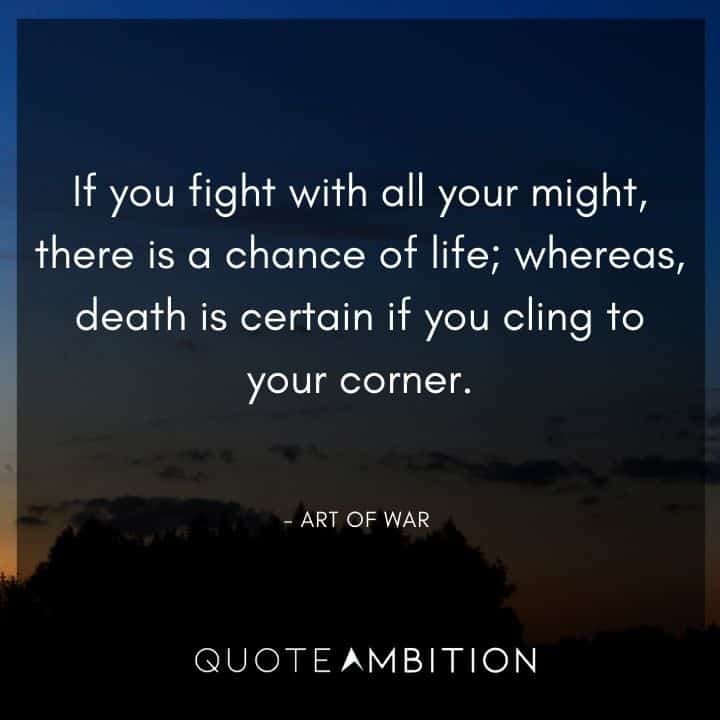
115. “If you fight with all your might, there is a chance of life; whereas, death is certain if you cling to your corner.”
116. “Conceal your dispositions, and your condition will remain secret, which leads to victory; show your dispositions, and your condition will become patent, which leads to defeat.”
117. “Success in warfare is gained by carefully accommodating ourselves to the enemy’s purpose.”
118. “When the outlook is bright, bring it before their eyes; but tell them nothing when the situation is gloomy.”
119. “We cannot enter into alliances until we are acquainted with the designs of our neighbors.”
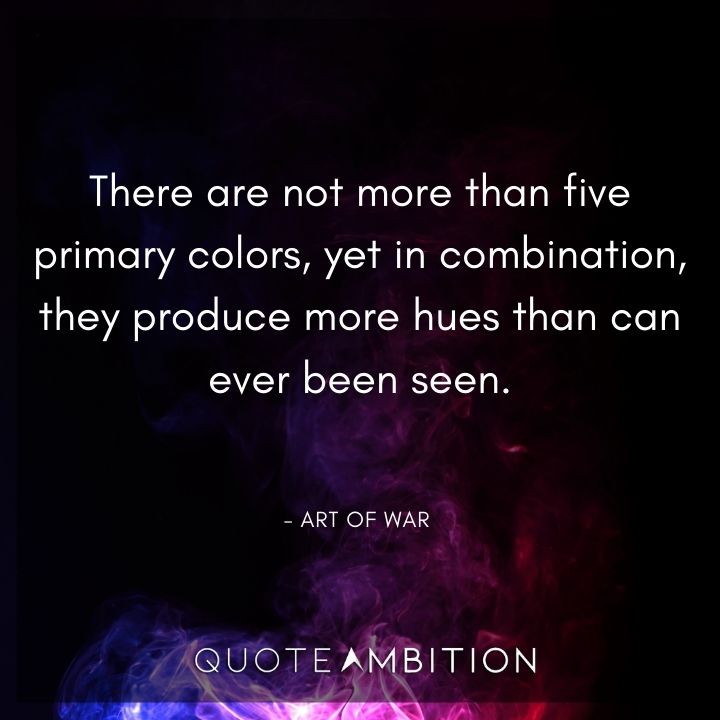
120. “There are not more than five primary colors, yet in combination, they produce more hues than can ever been seen.”
121. “To lift an autumn hair is no sign of great strength; to see the sun and moon is no sign of sharp sight; to hear the noise of thunder is no sign of a quick ear.”
122. “No ruler should put troops into the field merely to gratify his own spleen; no general should fight a battle simply out of pique.”
123. “Standing on the defensive indicates insufficient strength; attacking, a superabundance of strength.”
124. “Be stern in the council-chamber. Show no weakness, and insist on your plans being ratified by the sovereign, so that you may control the situation.”
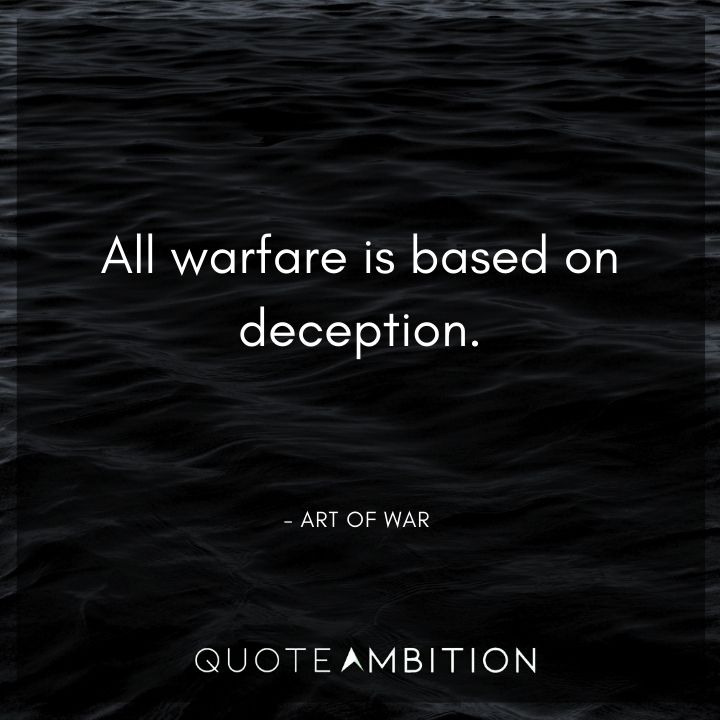
125. “All warfare is based on deception.”
126. “In difficult ground, press on; in encircled ground, devise stratagems; on death ground, fight.”
127. “The captured soldiers should be kindly treated and kept.”
128. “Opportunistic relationships can hardly be kept constant.”
129. “The rising of birds in their flight is the sign of an ambuscade. Startled beasts indicate that a sudden attack is coming.”
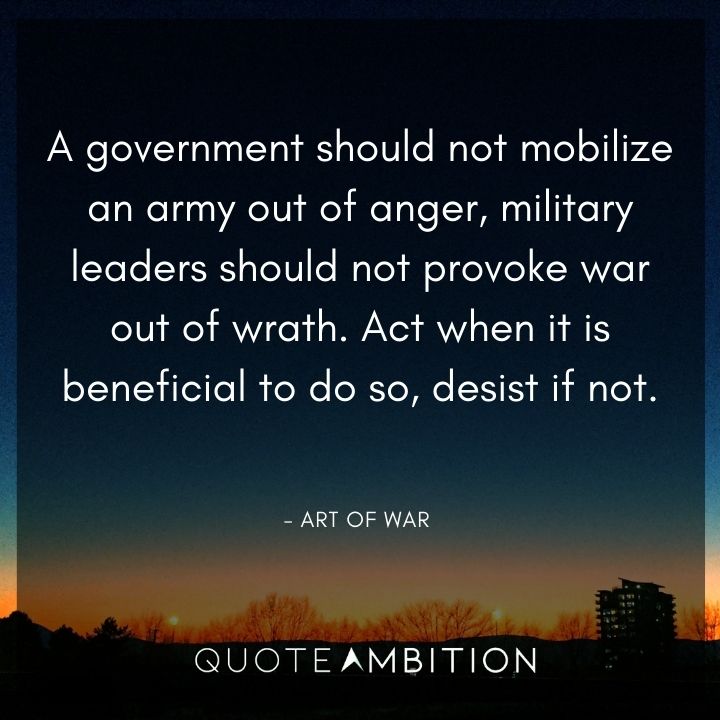
130. “A government should not mobilize an army out of anger, military leaders should not provoke war out of wrath. Act when it is beneficial to do so, desist if not.”
131. “Where there are repeated wars, the people are weakened; when they score repeated victories, rulers become haughty. Let haughty rulers command weakened people, and rare is the nation that will not perish as a result.”
132. “Some people think insufficiency means weakness and surplus means strength, but this impression is wrong.”
133. “There is no instance of a country having benefited from prolonged warfare.”
134. “Again, if the campaign is protracted, the resources of the state will not be equal to the strain.”
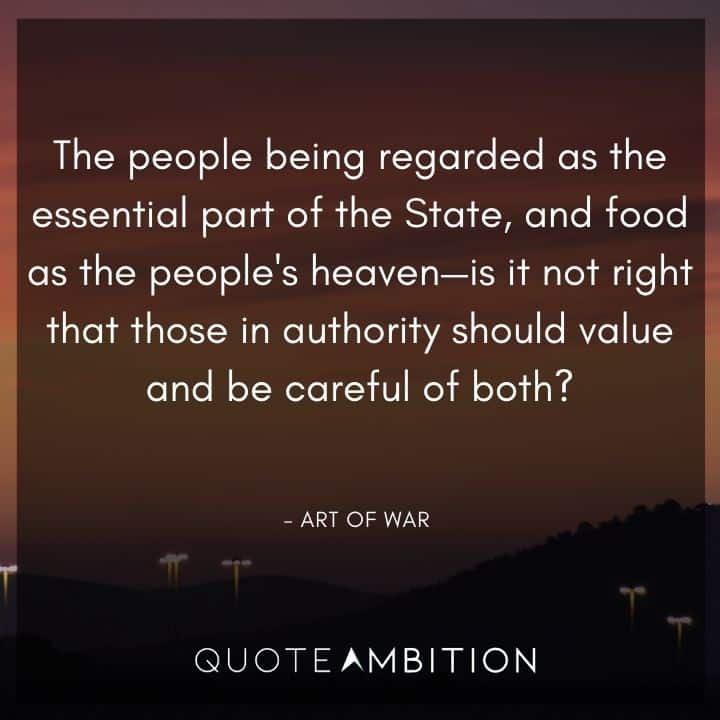
135. “The people being regarded as the essential part of the State, and food as the people’s heaven—is it not right that those in authority should value and be careful of both?”
136. “Neither is it the acme of excellence if you fight and conquer and the whole empire says, ‘Well done!’”
137. “It is better to recapture an army entire than to destroy it, to capture a regiment, a detachment or a company entire than to destroy them.”
138. “There are five things that hurt the people—there are local officials who use public office for personal benefit, taking improper advantage of their authority, holding weapons in one hand and people’s livelihood in the other, corrupting their offices, and bleeding the people.”
139. “The Way means inducing the people to have the same aim as the leadership.”
Art of War Quotes on the Will and Strength of Mind
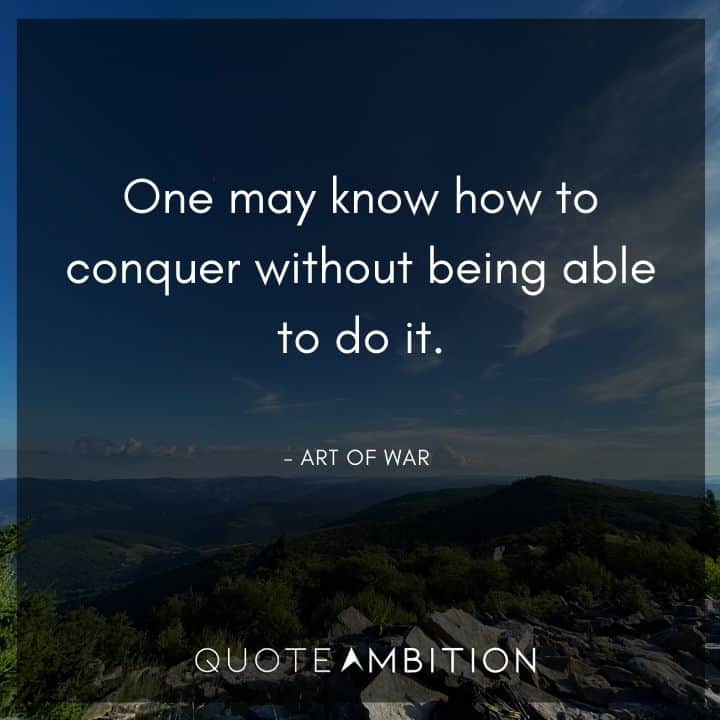
140. “One may know how to conquer without being able to do it.”
141. “Rouse him, and learn the principle of his activity or inactivity. Force him to reveal himself, so as to find out his vulnerable spots.”
142. “Ponder and deliberate before you make a move.”
143. “Bravery without forethought, causes a man to fight blindly and desperately like a mad bull. Such an opponent must not be encountered with brute force, but may be lured into an ambush and slain.”
144. “If ignorant both of your enemy and yourself, you are certain to be in peril.”
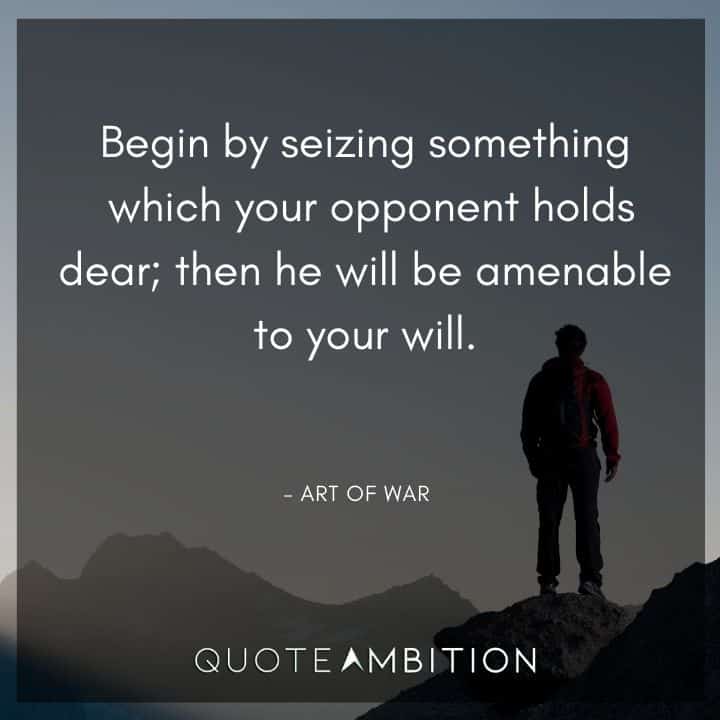
145. “Begin by seizing something which your opponent holds dear; then he will be amenable to your will.”
146. “Disorder came from order; fear came from courage; weakness came from strength.”
147. “Those skilled at making the enemy move do so by creating a situation to which he must conform; they entice him with something he is certain to take, and with lures of ostensible profit they await him in strength.”
148. “Foreknowledge cannot be gotten from ghosts and spirits, cannot be had by analogy, cannot be found out by calculation. It must be obtained from people, people who know the conditions of the enemy.”
149. “The end and aim of spying in all its five varieties is knowledge of the enemy; and this knowledge can only be derived, in the first instance, from the converted spy. Hence it is essential that the converted spy be treated with the utmost liberality.”
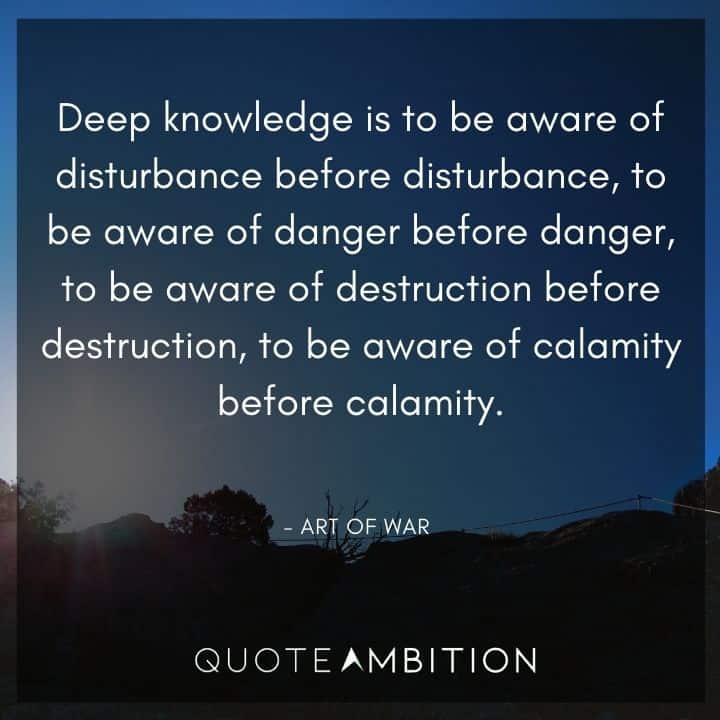
150. “Deep knowledge is to be aware of disturbance before disturbance, to be aware of danger before danger, to be aware of destruction before destruction, to be aware of calamity before calamity.”
151. “Whether in an advantageous position or a disadvantageous one, the opposite state should be always present to your mind.”
152. “It is the unemotional, reserved, calm, detached warrior who wins, not the hothead seeking vengeance and not the ambitious seeker of fortune.”
153. “Therefore, the clever combatant imposes his will on the enemy, but does not allow the enemy’s will to be imposed on him.”
154. “Thus, though we have heard of stupid haste in war, cleverness has never been seen associated with long delays.”
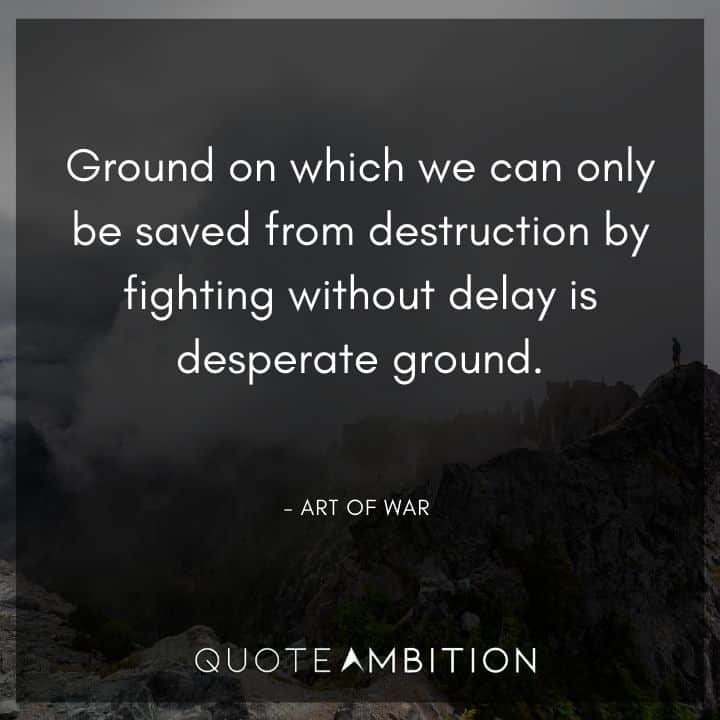
155. “Ground on which we can only be saved from destruction by fighting without delay is desperate ground.”
156. “The acquaintance of honorable people, even at a distance, does not add flowers in times of warmth and does not change its leaves in times of cold. It continues unfading through the four seasons, and becomes increasingly stable as it passes through ease and danger.”
157. “Life and death are of supreme importance. Time passes swiftly by and opportunity is lost. Each of us should strive to awaken, awaken. Awaken! Take heed. Do not squander your life.”
158. “The only chance of life lies in giving up all hope of it.”
159. “The true object of war is peace.”
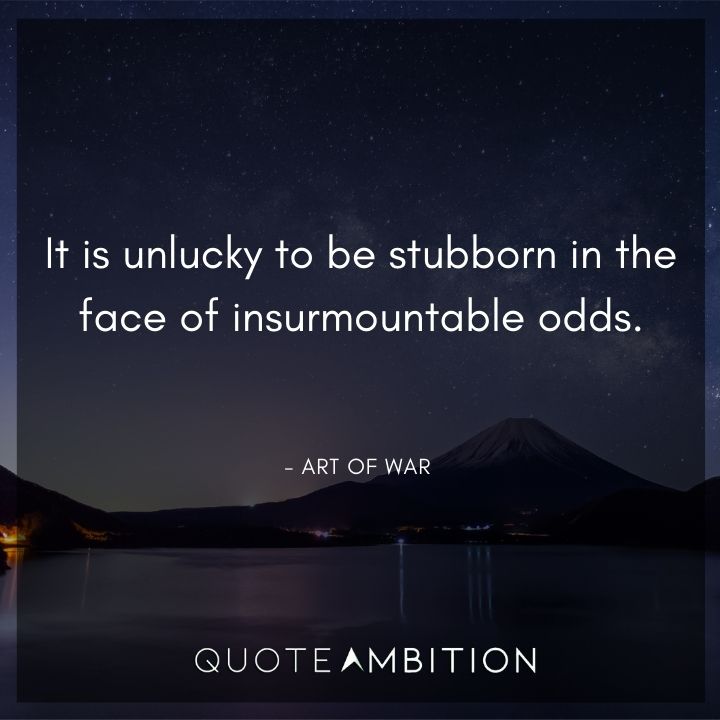
160. “It is unlucky to be stubborn in the face of insurmountable odds.”
Did These Quotes Inspire You To Learn More About Yourself and the People Around You?
Though the Art of War was initially written as a guide for war and was considered as a ‘bible’ for the battlefield, the knowledge Sun Tzu imparted with us can actually be applied to most aspects of our life. It’s main message is clear—life is a constant struggle which we work on each day, and if we just keep it in our minds to plan our next moves carefully and do our best with the tools we have in our lives, all our personal battles can be won.
Were these quotes able to help you determine your next move? What other lessons did you get from this collection? Let’s talk about it in the comments section below.
